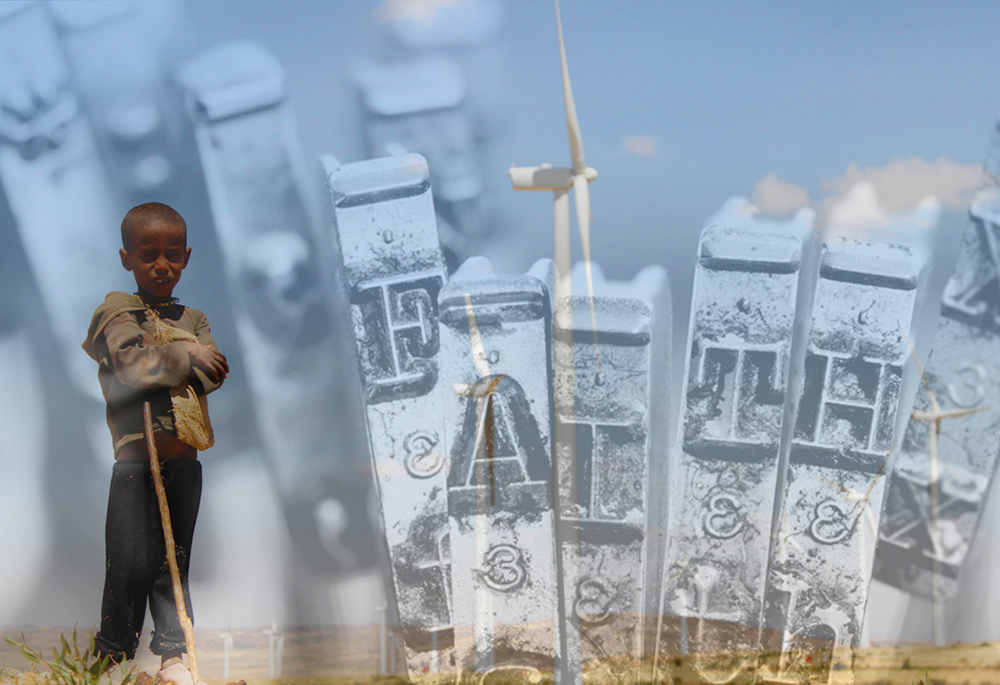
A boy stands in front of wind turbines at the Ashegoda Wind Farm, near Mekele in Ethiopia's Tigray region. (CNS/Reuters/Kumerra Gemechu; overlay photo: Dreamstime/Davinci)
There is an urgent need to train faith-based journalists and editors in reporting on the environment and climate challenges across the globe.
Without adequate faith and climate news coverage — on multiple platforms and in various languages — many of the communities hit hardest by climate impacts remain uninformed about the climate crisis, its causes and what their faith calls them to do about it.
I have worked as an environment reporter, radio host and podcast producer for the past three years. I'm also active in Catholic creation care initiatives like the Catholic Youth Network for Environmental Sustainability in Africa, CYNESA.
The dire state of faith-based news coverage of climate and other environmental issues became exceedingly evident to me after the United Nations conference on climate change, COP27, and the U.N. conference on biodiversity, COP15, held late last year.
With more than 3,000 reporters from 450 media houses at COP27, I was one of the few (perhaps the only one) from a Catholic broadcast media house like Radio Maria Kenya Nairobi, and only a few were from faith-based print publications, including the National Catholic Reporter's EarthBeat, The Christian Science Monitor, Episcopal News Service and the Association for Catholic Information in Africa.
While the faith-based print coverage of the global climate summit was good, coverage via live interviews, recorded news, television and radio shows was inadequate.
'The faith journalists speak to the hearts, souls and minds of human beings. They stand the best chance to change community behaviors and attitudes as we have seen in other aspects of life.'
—Collins Oduor
Print news often doesn't reach important audiences in Africa, because many rural populations consume their news primarily through broadcast media. Those who could not read the written coverage — in English — didn't have access to much information about what was going on at the U.N. climate meeting without turning to mainstream media sources.
For many of those audiences, especially in developing nations that are severely impacted by the climate crisis and need to be prepared to adapt, the religious angle may be the best way to grab their attention and convince them to take climate change seriously.
"Most faithful listen to the faith leaders more than politicians and science experts," said Collins Oduor, climate change program coordinator of DORCAS AID International, noting that "84% of the global population affiliates with faith."
"The faith journalists speak to the hearts, souls and minds of human beings. They stand the best chance to change community behaviors and attitudes as we have seen in other aspects of life," he said.
It is essential that accurate information about the climate crisis and the skills needed to meet current and future challenges be disseminated by trusted journalists to these communities.
"The church has enough journalists, but it needs good journalists to report on climate change. Climate change training would help them ask relevant questions," said Fr. Stephen Makagutu, assistant of the permanent observer mission of the Holy See to the U.N. Office at Nairobi.
In addition to training faith-based journalists to cover climate issues and offer coverage via multimedia platforms, accurate climate information from trusted sources needs to be made available in more languages.
The U.N. Intergovernmental Panel on Climate Change reports are translated into only the six languages of the United Nations. Of the 8 billion people on the planet, more than half do not speak the U.N. languages. And many languages neither have a direct translation of the term "climate change" nor a basic understanding of what the term means.
In addition, societies are modernizing and younger generations are dissociating from their mother tongues, increasing the challenge of translating information into languages used by Indigenous peoples in marginalized communities.
Advertisement
Faith-based broadcast media can be used to drive local action by creating awareness of climate change in various languages to enable their listeners to achieve the nationally determined contributions of their countries to the Paris Agreement goals.
"Translating climate change information to over 4,000 languages is not easy and it's expensive," said Oduor, but "the capacity gap to translate is slowly diminishing as languages are dynamic and keep changing."
People of faith act as first responders to climate emergencies in many parts of the world. They are well-placed to articulate the challenges they face and create awareness of the need to care for our common home.
Equipped with more multimedia and translation resources, editors could better give platforms to faith leaders to engage with audiences about environment and climate issues in ways that are most accessible to them.
Climate news includes hard stories about accidents, death, danger, hate, gossip and insecurity. This creates the perception that a climate-changed world is a dangerous place, doomed forever. Many people report feeling anxious, depressed or even hopeless in the face of the climate crisis.
Faith-based reporting offers a perspective grounded in hope for a better tomorrow. It is true climate change requires urgent attention and action, but there is only so much negative news a human being can consume before disengaging for their own sanity.
Environmental reporting ought to offer hope, agency and human dignity, just like faith. Stories of hope can help individual communities learn how to adapt and mitigate as we negotiate and agree on how to solve problems on a larger, international scale. But those stories will only reach these critical audiences if shared in accessible and engaging ways by trusted outlets.
Faith based journalists, if supported with the necessary training and resources, are uniquely positioned to meet that challenge.







